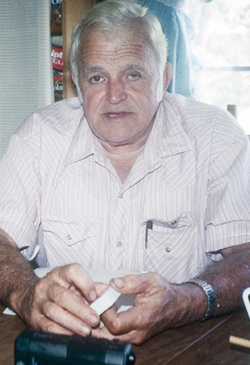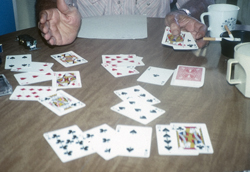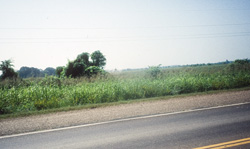Introduction to Delta Pieces: Northeast Louisiana Folklife
Map: Cultural Micro-Regions of the Delta, Northeast Louisiana

The Louisiana Delta: Land of Rivers








Ethnic Groups










Working in the Delta








Homemaking in the Delta




Worshiping in the Delta



Making Music in the Delta




Playing in the Delta







Telling Stories in the Delta



Delta Archival Materials
Bibliography

Gambling Money Don't Have No Home: Playing Poker and Shooting Dice in the Louisiana Delta
By Donald W. Hatley
Gambling money don't have no home. You can have it this hour. He'll have it next hour. You can have it tonight He'll have it tomorrow. You'll have it this week. He'll have it next week. Gambling money don't have no home.
--Don McClure, Jonesville Gambler
The proximity to New Orleans as the port of entry for such games as vingt-et-un (Twenty-One or Black Jack), roulette, faro, poker, and craps and, later, the availability of cash from commercial fishing and soybean farming contributed to a lively gambling tradition in the Louisiana Delta. Today, except for a few crap shooters in the "quarters" and a periodic "bar game," gambling in the Delta has moved to the "Boat" (Lady Luck docked at Natchez). However, before the 1970s, in hunting camps, crossroads grocery stores, and package liquor stores, games of every size and description could be found. In fact, for eight years in the 1970s, a "Bean Game" at Sicily Island was the largest poker game in Louisiana.
Although many serious Delta gamblers miss the Bean Games and the high rollers who "fueled them," veteran gambler Don McClure remembers other, older games and the colorful characters such as Limber Jim Bradford, Jug Adams, and Bill Storms who played in them. While most white gamblers around Jonesville prefer cards, there is a dice shooting tradition and region-specific folk poetry in the dice calls. As with tales of poker, crap shooting narratives divide into various categories, including accounts of unbelievable luck and "cheating stories" focusing on crooks who "slide" the dice or "load" them with mercury.
The Louisiana Delta affords an almost unlimited source of folk narratives, localized terminology, and superstition about gambling. However, the stories that follow divide into five topics: Cold Decking, the Throwdown, Dado Cross Narratives, Jonesville Poker, and working the dice.
The Cold Deck
Charles Keenan grew up in northern Concordia Parish, Louisiana where his father ran a bar in the 1940s frequented by the old-time gamblers around the small Delta community of Clayton. Because of time spent around his father's bar, Keenan was educated beyond the norm to the pitfalls awaiting most country boys who went into the military service. Keenan remembers:
I was in the Air Force in the early 60s stationed at a little communications center in southern Tennessee. A buddy and I got leave and headed south to Louisiana. Just as we crossed the state line separating Tennessee from Mississippi, I noticed a little bar, probably called "The Last Chance." Anyway, I told my buddy it was a long way to Louisiana, and I wanted a beer. So we went back. The bar was empty except for the bartender and two guys shuffling a deck. We had a couple of beers, and one of the guys playing with the cards said, "Hey, fella, let's play a hand for a beer. You deal." Well, I dealt myself five cards and caught a pair of aces and a pair of tens. Before I knew it, those guys had moved me off the beer bet, and I had put $15 in the pot and needed another $200 to stay. My buddy was egging me on, but I felt something was wrong so I folded. My friend begged me to let him pay out the hand, but I wouldn't do it. I didn't know how, but I knew the game was rigged even with me dealing the cards. I just donated my $15.
Although Keenan could have been lucky, more than likely his prior experience with the game saved him from getting "cold decked," one of the oldest card tricks in the Delta.
George H Devol who published his autobiography, Forty Years a Gambler on the Mississippi, in 1926, was an expert at dealing a "Cold Deck." A professional card shark who operated out of New Orleans and made periodic runs to Natchez-Under-The-Hill and up the many Mississippi tributaries into the Louisiana back country, Devol recalls playing with a "mark" who went to sleep. Devol writes, "I picked up the deck and took four aces and four kings, with an odd card to each. I gave him the Kings, and I took the Aces." Devol then put the deck in front of the sleeping man and woke him up. The victim dealt the cards, saw his four Kings, and covered Devol's wager of a $1,000. With his four "cold decked" aces, Devol pocketed the easy money and concluded, I used to make it a point to cold deck a sucker on his own deal, as they then have ... great confidence in their hands (Devol 21).
Henry Havard, veteran of the Delta "Bean" games, recalls one of his experiences with a "mechanic" and his "mule" who came over from Natchez to "work" a game in Jonesville. Around three o'clock a.m., one of the Natchez gamblers disappeared into the men's room and unbeknownst to the other players,
Came back with a cold deck...you know, a stacked deck which he slipped into the game. Yep, ...we got cold decked, and it cost me $900. A friend of mine got suspicious. We jumped 'em caught one in his car and the other in the toilet. We found one deck over the commode where they tried to hide it. 'Course we had the second deck. I never did get my money back ...just considered it $900 worth of experience.
Throwdown
In 1994, Billy Edwards served the dual roles of owner of Edwards Restaurant and Motel and the Mayor of Jonesville, Louisiana queen city of Black River. He grew up in the restaurant business and, as a young man in his twenties, worked "bar games" on both sides of the Mississippi River. Edwards explains: "Sometimes I dealt the hands, sometimes I caught them, sometimes I just sat around and passed signals to a partner in the game. What was my worst nightmare when it came to working a rigged delta Poker Game?" Edwards repeated the question. "I worried about a throwdown...you know, somebody catches onto you and pulls a gun and demands his money. It never happened to me, but it was always there.
Was the robbery of Humpty's Store on Cross Bayou a throwdown? Maybe ... maybe not. But everybody in the Louisiana Delta knows that on a hot Monday night in the summer of 1979, several men wearing ski masks and carrying submachine guns chained some of the highest rollers in Catahoula and Concordia Parishes to a meat table and drove off with $500 to $150,000. The amount varies according to teller and number of beers consumed.
Don McClure tells the story this way:
You're talking about where they robbed the store? I wasn't there but I've talked to all the parties. I knew 'em all and played with 'em .... They was playing right there at Horseshoe Lake where you cross Cross Bayou. Used to be a store there. The building's still there. Feller by the name of Humpty … can't remember Humpty's last name, was running the store. Well he had a game. That was back when the bean farmers was all doing well, and there was lots of money flowing. There was a pretty good bunch of them. Well, somebody knocked on the door … and they let 'em in. And it was some men that had ski masks on. They said they had machine guns … They robbed 'em, and nobody would ever say how much there was on the table but there was big bucks.... [there was] bean farmers makin' real money... I've seen $40,000-$50,000 in games there in Jonesville down at the old Long Horn.... One of them telling it said they took some chain, and they had a meat block there and they put chains around their necks and nailed them to that meat block.
While Don's account is fairly standard, other versions vary. Henry Havard, who was at Humpty's Game from time to time suspects he set up the robbery when, the week before he threw $10,000 cash on the table and declared, "Boys there it is … she all plavs." During that game, something occurred that Havard still can't figure. A deputy sheriff showed up to investigate a phantom shooting. Was someone trying to "time" how long it would take the "law" to show up? Havard also wonders about Dado Cross's cigarettes. During that robbery, Dado asked one of the robbers to reach for his pack of cigarettes, and the robber knew exactly where Dado had been sitting and which pack of cigarettes was his. How could a stranger know Dado's brand?
Havard's observations and other strange occurrences contribute to endless speculation and retelling about the Cross Bayou Robbery. Given the visceral relevance of Delta storytelling and the intensely knit nature of gamblers as a folk group, the future of stories about the robbery of Humpty's Poker Game seems assured.
The Dado Cross Narrative Cycle
Without a Dado Cross tale, a Louisiana Delta raconteur is defenseless in storytelling sessions around the poker table or the barbecue grill. Whether it's "Dado and the Mississippi Watermelons" or "Dado and the Wreck at Dado Curve" or "Dado and the Shoestrings in the Delta," telling a Dado Cross story is mandatory.
Although Dado was already on his way to stardom before the Cross Bayou Robbery, his presence and actions during the robbed guarantee his status as one of the most talked about men in the Louisiana Delta. Dado's speech impediment plays an integral role in these stories, and some stories are limited in polite conversation since they may not be necessarily suitable for all audiences. The following Dado Cross stories come from Don McClure's narrative.
"Dado and the Shoestrings"
Like I said, the robbers took some chain, and they had a meat block there and they nailed everybody up, chained 'em up o nto that meat block. But they run out of chain when they come to Dado. One of 'em said, "Looks like we're gonna have to shoot this one." Dado said, "Oh no...don't do that. A pair of toostrings will hold me."
"Dado and the Fifteen Minute Wait"
They said they told 'em, "Anybody looks out that door inside of fifteen minutes or moves, we're gonna have a man watching, and he'll kill the first one to move in 15 minutes." They all set there, all of 'em chained to the block 'cept Dado. He was the only one that could really move. They waited their 15 minutes, and somebody said, "Damnit, Dado, get out of here and call the law." Dado said, "Let's dib 'em another five minutes.
Don Wiley, another resident from the area also shares some Dado Cross stories.
"Dado and the Check"
Dado kept money in every pocket. When those robbers asked for money, Dado started pulling money out of his hat, out of his pockets…even took off his shoes and took money out of them. One robber asked, "Is that all the cash?" Dado said real quick, "Yet t'ir, but I tin sure div' you a check if you don't toot me."
This narrator wished to remain anonymous, yet his story is one of the most popular in the cycle.
"Dado and the Operator"
You've got to remember that Dado Cross was real smart. When he saw they weren't gonna tie him up he started thinking, making plans. When they got to him, he said, "Opuwaiter can't e'en wunnerstan me." A robber said, "What did you say?" "I t'ed, opuwaiter cain't e'ven wunnerstan me." The robber turned to one of the other players, "What did he say?" He's saying, "The operator can't even understand him."
You see, Dado knew the robbers might kill anybody they thought would call the law. Dado wanted to make damn sure they knew he couldn't even make a telephone call.
Jonesville Poker
In his discussion of professional gamblers on the Southwestern Frontier, John M. Findlay writes, "By commercializing betting games, sharpers remade American gambling for good … [They] constantly reshap[ed] games of chance in order to accommodate both their own needs and the shifting preferences of the American public" (Findlay 48).
Findlay probably never met Mr. Henry Swayze, famed man behind the "Chips" at the Long Horn in Jonesville, but he could very well have had him in mind with the above comment. Swayze minted Jonesville poker, a variant of five card stud. Instead of dealing one card down, Swayze dealt two cards down. There is some disagreement over whether he dealt the first and fifth cards down or the first two, but there is no doubt about his purpose in gambling or in creating Jonesville Poker. Don McClure explains:
He would just touch that pot and two or three of them chips would just run up his arm. He knew how to cut. If you played with him any length of time what money was in the game he was gonna have it because he would cut it out. And he was a good patient poker player. If he bet, you better not be stupid enough to call him. Of course, he didn't have to bet because he was going to end up with the money anyway.
Based on McClure's comments, it is easy to define Swayze. According to Herbert L. Marx, Jr., author of Gambling in America, Swayze was a percentage gambler, one "almost impossible to trick into accepting a bad bet… The difference between an investment and a gamble is keenly felt by the percentage gambler (43)." One informant other than McClure has described Swayze and her version of Jonesville Poker. "You see it's a tricking game. He invented it to keep people in the game. When he got the first two cards down, there was no way for him to lose, but he would keep suckers in because they didn't know they were beat yet." (Name withheld). As the above comments suggest, with his new game, Swayze epitomized the professional gambler who reshaped a game, in this case five card stud, to fit his own needs and to give the suckers a sense that they were having a new experience with the game.
Tensas Toddy: "Working" the Dice in the Delta
Charlie Keenan laments that nobody wants to work with the dice at the new Louisiana casinos. "People just won't get down and talk to them. Everybody's either too uptight, or they just don't know that you're supposed to talk to the bones, you know 'work 'em. "
While "working" the dice in the casinos may not be popular, Don McClure and others still know how to do it. Coming out (Shooting the first pass), a crap shooter might say, "Seven come a eleven, everybody goes to heaven" while his opponent yells, "Give us that old Acey Deucy." Once the point is made (number that the shooter has to make to win), many calls can be used. To get a four, somebody might say "for Little Joe from Kocomo."
One of the more interesting calls is for a five. When there are no ladies around, a Delta caller will yell, "Fever in the Funkhouse, Run Whores Run." If there is a woman in the crowd might change to "Run Ladies Run." Older players called for "Two Little Rolls of Rabbit Shit" in begging for a six. When crapping out on a seven, someone is sure to say, "Up Jumped the Devil."
The number eight apparently prompts the most creativity. Shooting "Stump" dice back on Larto Lake Don Wiley recalls that in calling for an eight, somebody was sure to pray for "Eight Tucks in Euler's Drawers" while even on the "Boat" some brave soul might let his hair down a bit and say, "Eight Skate and Donate." Of course, every shooter remembers "Ater from Decatur" who was reputed to sell "it" for "ten cents countywide."
The lack of dice calls in public gambling may result from the risqué nature of the rhymes. When calling for a nine, how many Southern men in front of women would say, "Awright now, Neener Ross rode a Fartin' Hoss" or when pleading for a ten use the somewhat mysterious physiological observation, "Tensas Toddy, all ass and no body." Eleven seems to prompt little thought or interest although once in a while a Delta craps shooter might say, "Yo, eleven" and, when describing a twelve, say "boxcars" or "midnight."
Conclusion
As my introductory comments state, this short study includes examples from the vibrant, evolving story of gambling in the Louisiana Delta. Delta gamblers are a true folk group, united by a wide variety of stories, poems, words, and customs. For the most part their verbal and customary culture lies untouched, awaiting the collector with a bit of time and interest.
Works Cited
Devol George. Forty Years a Gambler of the Mississippi. New York: Henry Holt, 1926.
Edwards, Billy. Personal Interview. 1994.
Findlay, John M. People of Chance: Gambling in American Society from Jamestown to Las Vegas. New York: Oxford University Press, 1986.
Keenan, Charlie. Personal interview. 1994.
Havard, Henry. Personal interview. 1994.
McClure Don Personal interview. 1994.
Marx, Herbert. Gambling in America. New York: H. W. Wilson, 1952.






